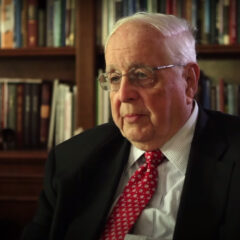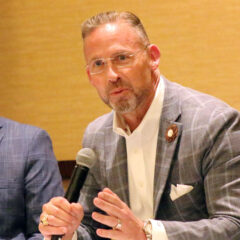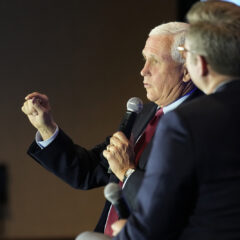INDIANAPOLIS (RNS) — Delegates to the Southern Baptist Convention’s annual meeting passed a resolution Wednesday (June 12) calling for more government regulation of in vitro fertilization and urging the denomination’s members themselves pursuing IVF fertility treatments to limit the number of embryos created in the process.
But the delegates fell short of calling for a ban on IVF or opposing it outright — a stance abortion foes have been agitating for since an Alabama court ruled in February that unused frozen embryos, often destroyed intentionally or inadvertently after being stored, are protected by wrongful-death laws.
Debate over unused embryos has taken on a new intensity as IVF has become a new front line of the abortion issue since the fall of Roe v. Wade.
In the past, Southern Baptists have passed resolutions opposing using frozen embryos as a source for stem cells, cloning or other experiments but have not considered a resolution on IVF itself.
The resolution passed Wednesday urged Southern Baptists “to reaffirm the unconditional value and right to life of every human being, including those in an embryonic stage, and to only utilize reproductive technologies consistent with that affirmation, especially in the number of embryos generated in the IVF process.”
The resolution also affirmed Southern Baptist belief that children are beloved by God from the moment of their conception, including those conceived through IVF. “Though all children are to be fully respected and protected, not all technological means of assisting human reproduction are equally God-honoring or morally justified,” the resolution states.

Messengers vote at the Southern Baptist Convention annual meeting at the Indiana Convention Center in Indianapolis, June 12, 2024. (RNS Photo/AJ Mast)
During the brief but passionate debate before the resolution was passed in the annual meeting’s closing session, Daniel Taylor, a messenger (as the SBC delegates are called) from Charity Baptist Church of Paris, Michigan, sought to soften the language of the resolution to emphasize that IVF can be used in ethical ways. Saying he thanked God for IVF, Taylor told of two church friends who were able to become pregnant using the treatment and give birth to a child who is now his godson.
“I request this resolution be amended, because in its original form, the resolution would castigate and condemn the entirely moral and ethical actions of these two friends of mine, calling their faithful sacrifice, struggle and blessing a wicked thing,” he said.
That amendment was voted down.
Another messenger, Zach Sahadak from the First Baptist Church of Fairborn, Ohio, said he and his wife had one child through IVF and another on the way. They have retained an additional 10 embryos, he said, which the couple will either use for future attempts at pregnancy or will donate to another family. While he believes in the sanctity of life, he said, he opposed the resolution.
“I’m against the idea that this technology is so wicked that it cannot be employed,” he said.
Monica Hall, a messenger from Oak Grove Baptist Church in Paducah, Kentucky, who supported the resolution, told messengers that frozen embryos she had adopted did not survive the process. She said she now believes IVF is unethical and does not uphold the sanctity of life.
“There is no way to describe the treatment of embryos at any point of the IVF process as ethical or dignified,” she said.
Members of the SBC’s resolution committee acknowledged that Southern Baptists have a wide range of views about IVF and said the resolution was intended to engender more in-depth conversations about the ethics of the treatment. SBC resolutions have no binding authority and are meant only to reflect the views of the messengers at the annual meeting where the resolution was approved.
But too many Christians, the committee said, use IVF without thinking about those ethics.
“We need to slow down,” said Jason Thacker, an assistant professor of philosophy and ethics at Boyce College in Louisville, Kentucky, who served as an adviser to the committee. Thacker added that a long-term goal was “the end of IVF as routinely practiced” and said more regulation of IVF is needed.
Thacker is a fellow at the SBC’s Ethics and Religious Liberty Commission, which has advocated for legal restrictions on IVF. Brent Leatherwood, president of the ERLC, recently wrote to the U.S. Senate, asking for more IVF regulation.

Jason Thacker speaks to the media at the Southern Baptist Convention annual meeting at the Indiana Convention Center in Indianapolis, June 12, 2024. (RNS Photo/AJ Mast)
“We urge legislators to develop and implement a system of federal oversight that protects and informs women and ensures embryos are treated with care, even as we oppose the general practice of IVF,” Leatherwood wrote.
Al Mohler, the president of Southern Baptist Theological Seminary and a co-author of the IVF resolution, said he has sympathy for infertile couples who consider using IVF. Their longing for children, however, can’t be answered by immoral means, Mohler told a gathering organized by the Danbury Institute on Monday, before the vote was taken.
Mohler condemned the procedure forcefully, calling it “an engineered system whereby multiple embryos are created only for most of them, assuredly, to be destroyed.”
“That is as immoral as anything we could imagine,” he said, noting that LGBTQ couples use IVF to have children. He accused SBC churches of being unwilling to confront the immorality of IVF.
“We have compromise in our churches,” Mohler said, calling support for IVF a sign that Christians who say they are pro-life don’t truly believe in the sanctity of life.
At the Danbury Institute session, Mohler, who has become a proponent of the so-called abolition movement that seeks to jail women who have abortions, also took aim at the broader pro-life movement for not being committed enough to the cause.

Al Mohler, president of the Southern Baptist Theological Seminary, speaks from the floor during the Southern Baptist Convention annual meeting at the Indiana Convention Center in Indianapolis, June 12, 2024. (RNS Photo/AJ Mast)
“Restricting abortion is not a pro-life victory,” he said. “The pro-life victory is the elimination of the murder of the unborn. And that means in every stage of fertilization all the way to natural death.”
Andrew Hébert, pastor of Mobberly Baptist Church in Longview, Texas, criticized the resolution, saying it has already confused pastors and church members alike. While he agrees that there are ethical concerns with IVF, he thinks that the resolution was the wrong way to address them. “It was unhelpful to bring that resolution to the floor,” he said.
Hébert said there are ethical issues involved with IVF, including what happens with any leftover frozen embryos and the possibility that parents will choose an embryo based on its gender. But he said these issues deserve more than a few minutes’ discussion on the floor of a denominational business meeting.
The resolution also sends a message, Hébert said, to infertile Southern Baptist couples who may be considering IVF or who have children conceived by IVF. There have been such couples in every church he has served, he told Religion News Service.
“Because they are pro-life, they desire to have children and love them and they are looking for an opportunity to do that,” he said. “To have a statement that says we’re against this is a confusing signal to many in our churches.”
The Southern Baptists also passed resolutions condemning Hamas’ terrorist attacks of Oct. 7 and opposing antisemitism. Another reaffirmed their commitment to religious liberty and rejected “any suggestion that our historic, God-given distinctive of religious liberty should be abandoned in favor of a state-mandated religion.” They also voiced support for “just war” theory and urged churches to cooperate on evangelism.
One resolution that flew under the radar seemed to address leadership scandals. In recent years, several SBC leaders, including past Presidents Paige Patterson and Paul Pressler, have been accused of sexual misconduct or covering up abuse. Another leader, former SBC Executive Committee President Frank Page, resigned in scandal in 2018 after being accused of a “morally inappropriate relationship in the past.”
The resolution this week called for SBC leaders to act with integrity and lamented the ethical failing of church leaders. While not naming names, the resolution instead said: “we call to repentance leaders who have engaged in public or private sin, abused their power, misused Convention funds, committed crimes, engaged in deception, covered for the sin of others, resisted God-ordained authority, or violated trust.”
That resolution passed overwhelmingly with no discussion but gained little attention due to the lack of debate. Resolutions committee chair Kristen Ferguson, an associate dean at Gateway Seminary, said that was a sign Southern Baptists are united on the need for ethical leaders.
(Adelle M. Banks contributed to this report. This story has been updated.)










